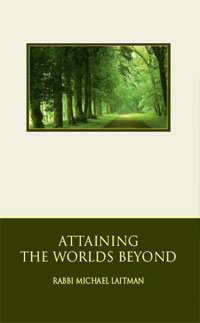Shortening the Path for Self-Correction
There are two opposite forces acting upon us: the altruistic force, which professes that living the Will of the Creator should be the ultimate purpose in this world, and that all should be for His sake; and the egoistic force, which maintains that everything in this world is created for human beings and because of them.
Although, in all cases, the higher altruistic force prevails, there exists the long path of suffering. However, there is also a short path, known as the path of Kabbalah.
Every person should voluntarily strive to radically shorten the path and the time for self-correction, otherwise involuntarily one will be forced to accept the path of suffering in order to arrive at the same destination. The Creator will inevitably force one to accept the ways of Kabbalah.
The Paradox of Love in Our World
The most natural feeling of a person is love of oneself, which is ultimately epitomized in newborns and in children. But no less natural is the feeling of love for another being born out of love for oneself, which provides countless themes for art and poetry. There is no scientific explanation for love and the processes that bring it about.
In our lives, we have all encountered the natural phenomenon, inherent to our lives, of mutual love, of the surge of this feeling, and then, oddly, of its decline. Precisely in the case of mutual love, the stronger the feeling, the quicker it passes.
Conversely, a faint feeling of one person often spurs a very intense feeling of the other, but a sudden return of emotion may very well lessen the original feeling of love. This paradox can be observed in the examples of various types of love: love between the sexes, between parents and children, and so on.
Moreover, it can be said that if one exhibits a great love for another, one does not give the other the opportunity to long for and to love the other more intensely. That is, the display of great love does not allow the loved one to respond to the full extent of one’s feelings, but, on the contrary, gradually transforms the feelings of love into hatred. This is due to the fact that the one who is loved stops fearing to lose the one who loves, experiencing the eternal unconditional love of the latter.
Aspiring to more Strongly Love the Creator
But if in our world, one rarely gets a chance to love another, even egoistically, it is not surprising that the feeling of altruistic love is completely foreign and unattainable for us. Since it is precisely this love that is bestowed upon us by the Creator, He conceals His feeling until we develop the qualities needed to answer Him with a full and constant reciprocity.
As long as we feel no love towards ourselves, we will accept any love. But as soon as we receive the love and are satiated with it, we begin to be more selective and to desire only the feelings of unusually great intensity.
And therein lies the possibility of a constant aspiration to increase the strength of one’s love for the Creator. An unwavering, constant, mutual love is possible only if it does not depend on anything.
For this reason, the love of the Creator is concealed from us, and is revealed gradually in the consciousness of the Kabbalist, to the degree that the latter is able to rid himself of egoism, which is the sole cause for the waning of the feeling of mutual love in our world.
Feelings that Bring Us to the Creator’s Goal
We have been created egoists in order to give us the capacity to expand the boundaries of our own feelings by allowing us to increasingly sense the Creator’s unveiling love. It is only by sensing the Creator’s love, by desiring to unite with Him, that we yearn to be freed of egoism—the common enemy. It can be said that egoism is the third in the triangle of creation (the Creator, us, and egoism), allowing us to choose the Creator.
Moreover, all the acts of the Creator, the ultimate goal of creation and all His actions, irrespective of the way we see them, are formed on the basis of this absolute and constant love. The Light that emanates from the Creator—which constructed all the worlds and which created us, a micro-dose of which is found in our bodies and constitutes our life, reminds us of what our souls will be after their correction. That Light is the feeling of His Love.
The reason for our creation is a simple desire to create good, a desire to love and to gratify, a simple desire of altruism (thus, not understandable for us), a desire that we, the objects of His love, should experience His love in its entirety and find gratification in this, as well as in our own feeling of love for Him. Only a simultaneous sensation of these two feelings, so contradictory in our world, awards that complete pleasure that is the goal of the Creator.
Help in Destructing (Correcting) Our Egoism
Our entire nature can be denoted by a single word— egoism. One of the most manifest expressions of egoism is the perception of one’s own “self.” An individual can tolerate anything except the feeling of personal humiliation. In order to avoid humiliation, a person is often ready to die.
In all circumstances, be it poverty, defeat, loss, or betrayal, we always attempt, and actually do, find extraneous causes and reasons beyond our control that are responsible for our condition. Otherwise, we would never be able to exonerate ourselves in our own eyes or in the eyes of others, which our nature will not permit.
It will never allow us to humiliate ourselves, because in that way a part of creation, perceived by us in the form of the “self,” will be destroyed and removed from the world.
For this reason, our destruction of egoism is impossible and can only be accomplished with the help of the Creator. It can be replaced voluntarily only by elevating the importance of the goal of creation in our eyes above all else.
 “The Eternal Benefit Gained from Self-Correction” is based on the book, Attaining the Worlds Beyond by Dr. Michael Laitman.
“The Eternal Benefit Gained from Self-Correction” is based on the book, Attaining the Worlds Beyond by Dr. Michael Laitman.

